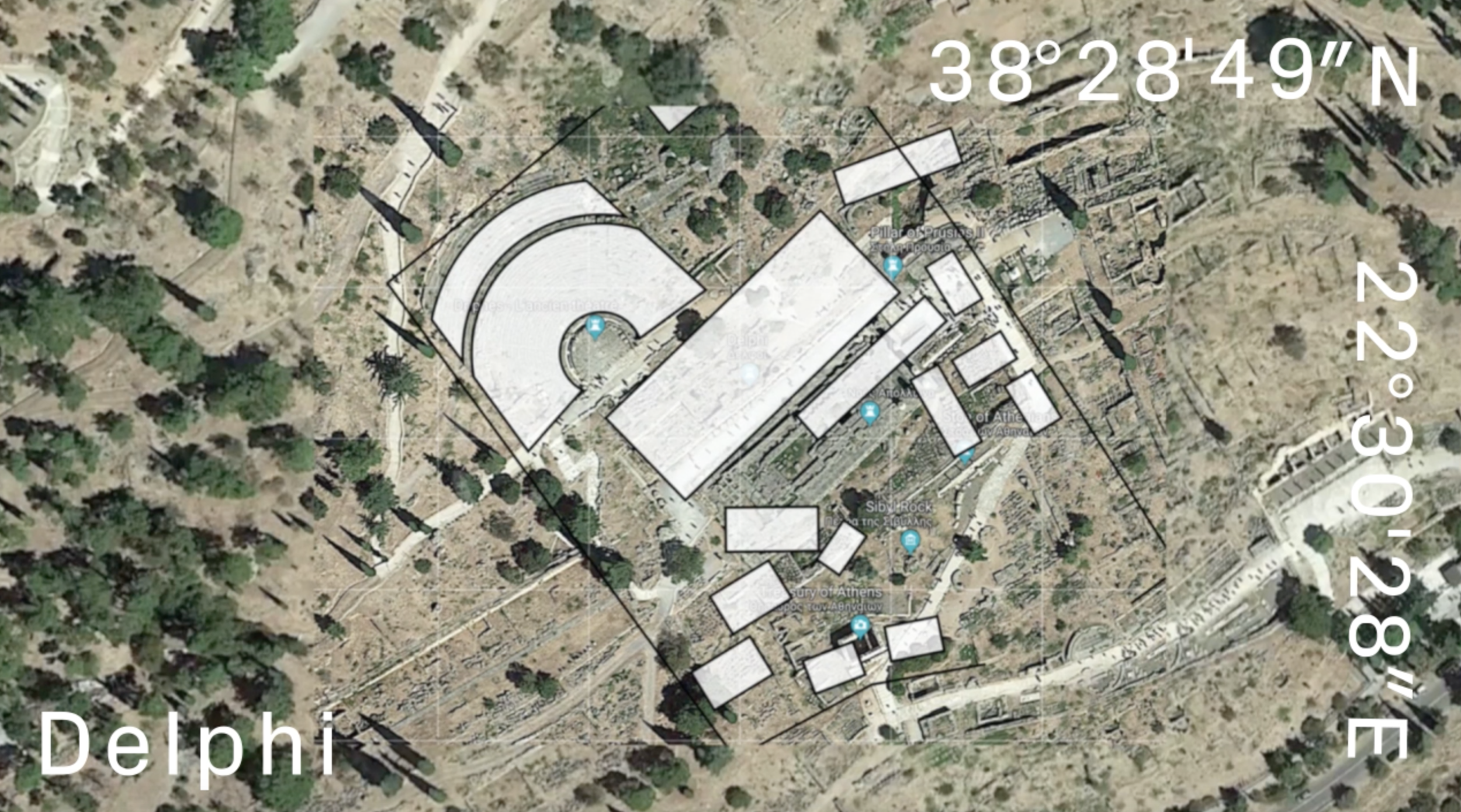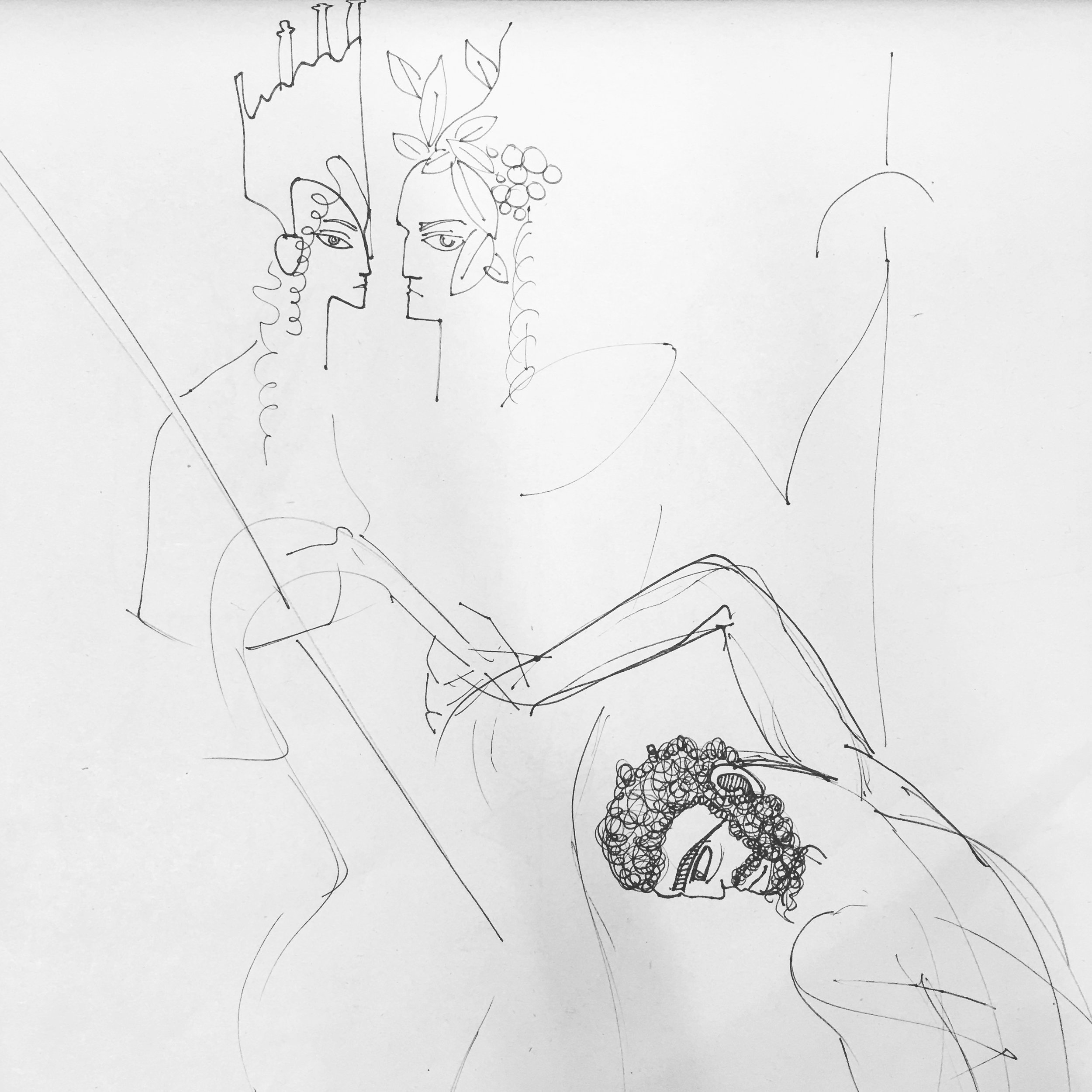to Orpheus
To all divine you can sing lovely songs,
Its godly presence you can call upon,
The bright-eyed Athena,
and Dionysos, the dancer,
whose honours among the blessed gods
are the highest;
Please call on Hebe, and Eileithyia,
invoke the great blessings
of Justice and Piety,
call upon the glorious Nymphs,
the lovely Mnemosyne,
And the holy Muses,
all nine, and then upon the Graces,
the Seasons, and the Year,
upon fair-tressed Leto,
and upon divine and revered Dione.
invoke Themis, the diviner,
and then invoke Night, oldest of all,
and do invoke light-bringing Day.
Faith, Dike, please call upon,
invoke dark-veiled Tethys,
and all of the Okeanos daughters;
sweet-speaking Nike,
queenly Adrasteia;
the battle-stirring maiden Pallas;
invoke the Mother of the immortals, Ourania;
Beginning and End, too,
which to all is most important,
ask them to come
in a spirit of joyous mercy
to this holy rite,
to this reverent libation.
Ask them to give us strength and spirit
To topple down the monopoly of the fathers,
the men, the kings, the presidents, nations, the states,
the families, there heritage, the property,
the senselessness of reproduction of existence.
to Mnemosyne
O great mother of a conscious joy!
You gave the birth to nine gold-crowned Muses
Who delight us in feasts and the pleasures of the song.
You give us tool to learn our past so we would not repeat it,
But the humanity proves to be a lazy student.
We pretend to get better at it,
But instead become more cheaply lavish, gluttonous and fakely prudent.
I call upon you, queen Mnemosyne,
free from the evil oblivion that harms the mind,
Strong in resolution towards knowledge, gracious and kind,
You give coherence to the souls of mortals.
You amplify our ability to think,
Remind us of the thoughts we store forever in our breasts.
O goddess, swipe away those who
Can’t see through clearness of your advice,
Who can’t tell past from future, a life from doom,
An emptiness from saturation.
Ward off oblivion from them: although it’d be violent for many,
To see the truth beyond the shades of Dolce and Gabbana,
They will be thankful through the tears of liberation
From the totality of late capitalistic and tyrannic gaze that went bananas.
to Icarus
O Icarus!
The darer, the risk-taker, the dreamer,
You inspire us to fly above the gut from which some of us are looking at the stars.
Your fate seduces, scares and transcends
To the heights of the impossible
For taking actions that allow to scent
The mere existence with the spice of life.
O Icarus!
Let your spirit fly
Above the heads of young and old who’d know
That there is never time that is too late or is too early for breakthrough,
There is no risk too high or low, too crazy to too small.
O Icarus!
Help break the chains of chastity of mind,
Towards unknown, the fog, the unpredicted,
Towards the shores that are and aren’t,
Where matters real and imaginary blend
Into the shapes of dreams that always can turn real
With guts, perseverance and courage {pronounced French}
to Andromeda
O Andromeda!
You needed not the saviours, the sacrifices or the arrogance of others.
The purity of soul of your devotion and resolve
Gives endless hope for all those ills to be dissolved
With prudence and clairvoyance.
I call on you to stand as you alone,
With no men coming to your rescue,
With no mothers to cause your demises,
With no conditions to be set around your heightened spirit.
I call on your clear, reverent roar
To help us to de-objectify ourselves from the song we are assigned to sing
To please another that in turn
Epitomises his position of power, greed and everlasting presence.
I call on you to break the bubbles
Of the superstitions claiming the reality of real,
The normality of normal,
The powerfulness of powerful,
The weaknesses of weak.
Stand for them to be able to show their faces, voices and rigour,
To open their souls beyond the scripts of the imagined duties,
To take their futures into own devices
And make us all desire them as shared.
to Prometheus
The great chain-breaker!
The great enlightener!
The sufferer for freedoms!
The opener of choices!
The sculptor of the nature!
We can’t be thankful for the miracles performed by you,
As animals we’ve been before your magic touch.
The awful Zeus, a patriarch and masculinity apostle,
Who tricked his way to power for claiming it eternal,
Imprisoned you for lighting up our consciousness.
His minions do the same since dawn of times:
The fathers, the husbands, the brothers, the bosses, the presidents,
The provosts, the directors, the doctors, the teachers, the artists,
The designers;
Few know who is misandrist but normalise misogynist.
Your call to light was accepted, but beyond it
We must go further to the beams of liberties that weren’t provided
As your fate was sealed by the very trickster.
Your liberator, his son, had not seen clearly,
the only half a step he made to free you.
But blind he was to see his father schemings
To mastermind control over the real and the fictitious.
O Prometheus!
I call on you to go on.
To give us light that is brighter,
So we will not leave the caves of present darkness and gloom,
As hopeless and ever repeating the stories of the old again retold.
The daring!
The chain-breaker!
The sufferer!
The survivor!
We stand with light you gave,
And wait for more to come,
With open ears, eyes and souls.
For the potential you saw in us at first
Still there, sleepy, but salient.
to Dionysus
O insewn, inspirer of the frenzied!
You bear life and give the sense to being;
Though always haunted by the rage of normals,
Whose comfort is protected by the sacredness of Hera.
All idols fall, and on their ruins
New ones installed by those who grasped a novel order.
Help us, o life-giver, to gather and to rejoice,
Amidst totality of emptiness in capitalistic Mordor.
Preserve the wine and dance,
Remind the politics of sacred ritual of theatre
And give us hope to overcome horizonless and senseless trance
Of end of history and everlasting present.
O loud, terrifying punisher of Pentheus!
We wait for your ascend with Metis’ wise daughter,
Your loud crying, shining double sister
With whom you’ll put an end to repetitions
Of violent sorrows in the void of crises.
Both you bring justice upon the privilege and repetition,
Upon those blind and unhearing,
Let them unlearn, re-skill and flourish anew
To the potential which all possess but few perform in currents.
To end all ends, to break the wheel,
To cut through self-devouring snake,
To help us stop expecting and start prospecting,
Cut through grip of the Son of Cronos,
Abandon his white-armed wife’s terror,
And look into infinity of worlds to come.














![curatorial duo DNV [dan'etvɐzmoʐnə], Caroline Carrion and Denis Maksimov](https://images.squarespace-cdn.com/content/v1/55e2e62ee4b01c33a57a0145/1470315633566-HTU80F0HC5OCY31MKA76/image.jpg)


